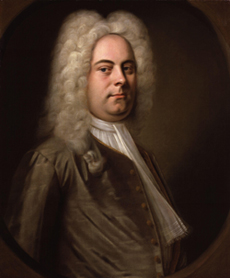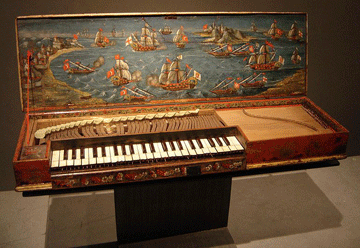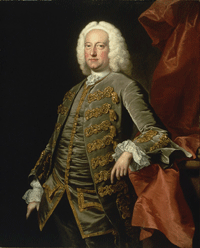|
George Frideric Handel
Answer
to Name
This Famous Person Game - November 2013
|
 |
George Frideric Handel was correctly identified by Ted Carlton of Utah, Teresa P. Bland, Scott and Carolyn Brown of Memories Flea An'Tique Mall in Prattville, Ala., and Pat Kimbrell of the Old School Antique Mall in Sylva, N.C. Note: Kay Cotton of Peachtree City, Ga., correctly identified Emily Dickenson in the November issue, but her name was left off inadvertently, so here are your 15 seconds of fame, Kay.
George Frederic Handel was born in the same year as Johann Sebastian Bach. Handel was born on Feb. 23, 1685, and Bach was born on March 21. Handel was born in the city of Halle, in present-day southern Germany. His parents were Dorothea Taust and Georg Handel. While his father wanted him to practice law and avoid music as a career, his mother secretly encouraged it. Young George taught himself to play a small piano-like clavichord that he smuggled into an upper room of his parents’ home and played at night.
|

George Frideric Handel.
|
Before he was a teenager, Handel mastered the clavichord, violin, organ, harpsichord and oboe. When he was seven, his father and young George visited the Duke of Saxe-Weissenfels. There, Handel crept into the Duke’s chapel and began to play his organ. Rightly impressed, the Duke persuaded Georg to allow his son to learn music from the church organist in the town of Halle. And so it began.
Handel did study law as his father wished but not for long. He left his studies, and by the age of 18 was working as a violinist and harpsichordist in an orchestra. His career led him through Germany and Italy and finally to England where he spent most of his musical life. Despite suffering bankruptcy twice during his life, he died a wealthy man and a generous man—he left money to charities, his servants, friends and family. He never married but was engaged once.
The Handel Reference Database at Stanford University has cataloged and collected more than 150 his works of music including: operas (44), oratorios (26), cantatas (11), anthems, odes and masques, canticles, sonatas, opus, and works for specific instruments. Doubtless, much of his work has been lost over the past 300 years.
|

|

|
|
A clavichord was used to practice music. Handel
learned to play on a smaller version of this instrument.
(Photo: Gerard Janot.)
|
Charles Jennens, ca. 1745, by Thomas Hudson (1701-79). Jennens provided the text of scriptures for the Messiah to Handel.
|
Handel is mostly known for the Messiah, which was first performed in Dublin, Ireland, in 1742 as a charity benefit for three hospitals. The libretti, or text, of scriptures for it was provided by Charles Jennens, a patron of the arts and landowner. The Messiah is an oratorio of three parts, not just the “Hallelujah Chorus.” Unlike an opera, an oratorio required no costumes or interaction between actors. It was easier and cheaper to produce and perform, which is why Handel switched to composing oratorios after moving to London and finding that Italian operas had fallen out of favor. Oratorios made him a rich man.
Handel composed the Messiah is 24 or 25 days, which was actually typical for him; he composed very quickly. He completed other works in about the same amount of time. However, Handel said during the creation of this masterpiece, “I did think I did see all heaven before me, and the great God himself.”1
Originally performed at Easter time, the Messiah has become a Christmas tradition.
Handel never married. He was very religious, but he had a temper, particularly when dealing with opera divas for whom he composed music.
He suffered two strokes later in life, but he recovered from them. Handel’s eyesight became progressively worse until he lost it completely in 1752, but even so, he continued composing and playing music. His last performance was of the Messiah a few days before his death on April 13 (or 14 depending on the source) in 1759. He is buried in Westminster Abbey in London.
Ludwig van Beethoven said of him: “Handel…is the unapproachable master of all masters. Go to him and learn to produce great effects with little means."2
-----------------------
1 Horatio Townsend, An Account of the Visit of Handel to Dublin, p. 93.
2 Chamber's encyclopœdia: a dictionary of universal knowledge, p. 542.
Learn
about more Famous People
|